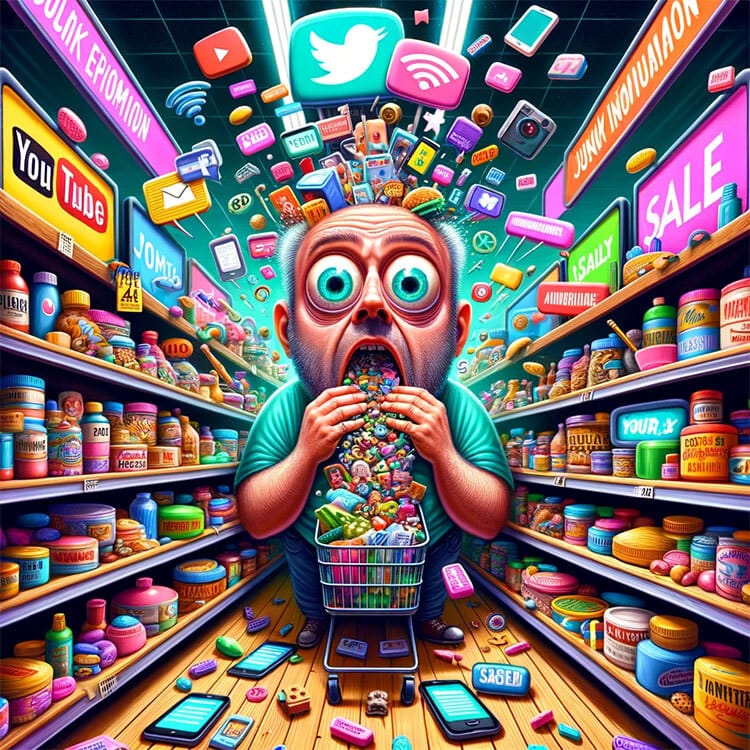Leaders are telling us they're overwhelmed at work.
Do you know any experts who help teams get organized and get better at setting priorities, so they won't be so overwhelmed?
I'm going to make an assumption. If you and your teams are feeling overwhelmed at work, you don't need me to describe that pain to you.
We're just trying to survive right now. We don't have time to develop new skills. We need to stop the bleeding
There's a lot of too much out there right now.
Because we heard about overwhelm a lot recently, we got curious.
What does it really mean to be overwhelmed?
As leaders, how can we understand what's driving our team's feelings of overwhelm?
What's working for organizations that decide to address overwhelm?
What are the simplest, most effective techniques for tackling overwhelm at work?
It's an overwhelming topic, so we're going to explore these questions across several articles.
Today, we'll break down what it means to be overwhelmed in an attempt to better understand the problem, and we'll explore how to start tackling it.
Then, in the next few articles, we'll share interviews with Bob Sutton and Rebecca Hinds, who experimented with ways to combat meeting and collaboration tool overload, and Diana Larsen, who created one of the most useful collaboration techniques we've seen for teams struggling with too much. We'll also share instructions for leading simple collaboration techniques and one complete mini-workshop, so you can work with your team to combat overwhelm in your work.
What is overwhelm and how do folks deal with it?
Overwhelm: (verb) to give too much of a thing, inundate, or overpower.
If you are overwhelmed, you have too much of something. Meetings, headlines, alerts, strong feelings, change, locusts, email, should do's, could do's, opponents... whatever it is, you have way too many of them for you to manage.
Overwhelmed: (adj.) Feeling overpowered by ideas and emotions (or locusts), to the point where you believe you're unable to deal with the situation.
The feeling of being overwhelmed is an emotional reaction to what we perceive as an unmanageable volume of something. It's a stress response.
So, if you are feeling overwhelmed, what can you do?
The causes of overwhelm are twofold: the sheer volume of things and our emotional reaction to them. Tackling overwhelm effectively means addressing both.
Our instinct is to get rid of things.
Prioritizing, purging, and Marie Kondo'ing the sh*t out of things, all provide some immediate relief. And as we'll learn from Bob and Rebecca, regularly adopting these subtraction mindsets can keep overwhelm at bay.
But to create lasting change, we must also reframe how we perceive these demands.
For example, changing "I have to..." to "I get to..." can tune down the stress and shift how we perceive a situation.
Try it on
I have to prepare dinner for my family -> I get to prepare dinner for my family.
I have to present at the next board meeting -> I get to present at the next board meeting.
I have to clear time in my team's schedule -> I get to clear time in my team's schedule.
I have to learn how to use AI for work -> I get to learn how to use AI for work.
I have to find a new career -> I get to find a new career.

Hurrah! You GET to help your team eliminate silly meetings and tasks that waste their time! Image by DALL•E
Reframing What Overwhelms Us
Using strategies like shifting “I have to” to “I get to” help us reframe our to-do list in more positive terms.
In a review of expert advice about how to combat overwhelm, this shift from a negative to a positive frame is often the first step.
Shirzad Chamine challenges us to view crises as opportunities, asking, “What do we need to do so that within three years we can say this current crisis was the best thing that could have happened to our company?”
April Rinne encourages us to embrace change itself by adopting the 8 Superpowers of a Flux mindset (We're talking to April next month. Stay tuned!)
Carol Dweck's' growth mindset transforms "I can't" into "I can't yet," turning perceived barriers into learning opportunities.
And in a most delightful celebration of positive reframing, Amy Edmondson was just honored as the number one thought leader by Thinkers 50 for her work showing leaders how to reframe failure for success.

“Come to the positive side, Luke!” - what Darth Vader would have said if he were a management expert.
These experts converge on a key idea: Reframing our challenges as opportunities can pivot our experience from being overwhelmed to being empowered.
That's step 1: Setting a frame that restores your power in the situation.
In our next article, we'll look at how to lead a group through step 2: mapping it out.
But even if we feel on top of our task lists, we can still feel overwhelmed by what we see in the world around us.
Reframing Information Overload
Information is abundant.
So much information is available to us - vastly more than at any other time in history. It's wicked cool! I love instant answers - don't you?
This awesome abundance tempts us to mindlessly snack on information feeds all day, leading to a very different kind of overwhelm.
Adapting to a Cognitively Obesogenic Environment
The evolution of our information supply is a lot like the evolution of our food supply. Neither our bodies nor our minds are adapted to the modern world.
When it comes to our bodies, the U.S. has seen an alarming rise in the number of people struggling with their weight and suffering from weight-related health challenges. This trend does not reveal a shift in our preferences, but rather, in our environment.
Many of us now live in an obesogenic environment.
An obesogenic environment is defined as the range of environmental characteristics that promote behaviors that increase the risk for obesity and hinder an individual's ability to maintain a healthy body weight, including:
- endocrine disruptors such as pollutants
- circadian rhythm and sleep disruptors
such as ambient light and noise from our neighborhoods
- labor and time saving technology such as cars and appliances
- prepared foods that are energy dense and nutrient poor
- social acceptance of frequent eating and
- features of our built environment such as a lack of sidewalks
or neighborhoods that are not safe for outdoor activity
Our bodies are adapted to a world where the food supply was more limited and we needed to move often in order to survive. An obesogenic environment can overwhelm our bodies with too much of what we don't need and too little of what we do.
The same is true for our minds.
We are adapted to a world where information was limited and we needed to stay vigilant to any changes in our community in order to survive.
Consider: if you were going to make a list of the environmental contributors to information overload, what would you list?
Micro-gossip on social media
Always-on marketing
Phone alerts
24-hr email delivery
Satellite internet...
As Ezra Klein said:
This is an acid bath for human cognition.
Information is now abundant, but we often treat it as if we must constantly seek it out and stay on top of all the latest. World news creates a false sense that everything is changing and we must remain hypervigilant.
Our information environment can overwhelm our thoughts and emotions with too much irrelevant fluff and insufficient substance.
It was 2005 when I started to recognize the negative impact industrial food had on my health. While I've complained about information overload for years, I only recently saw the clear parallels between what happened to our food and what's happened to our knowledge.
It's like we're each trying to eat our way through the equivalent of a mega grocery store's worth of highly processed, low-quality info snacks. Ridiculous!

Oh no! Slow down, info gobbler! Image by DALL•E
While the Internet has dramatically changed how modern work is executed, our mindset has failed to adapt. We were educated in institutions from the Industrial Era that taught us that information is finite, static, and scarce. But now we live and work in a world where information is infinite, dynamic, and abundant. Information is the fundamental building block of the world today, and our relationship to it determines everything from our quality of life, to the impact we’re able to make on the causes we care about.
I invite you to look through this new frame.
Information is abundantly available. You can tap into it whenever you need to.
You don't need to hoard it. You don't even need to deal with it.
You get to use it to solve the problems that matter to you and to make your world brighter.
I picked this up from Tiago Forte's Building a Second Brain, and it changed how I feel about the stream of knowledge flowing around me.
With this reframe, I'm no longer drowning. I'm standing high and dry on the bank, fishing for the keeper ideas.

Reframing! Oooh - there’s a keeper idea! Image by DALL•E
Start Now
Reducing overwhelm starts with reframing. You get to find ways to reduce your stress levels.
Adopt the reframing techniques we've shared, and coach your teams to do the same. Encourage them to 'fish' for those keeper ideas and discard the rest. It's the first step in transforming the overwhelm into a wellspring of innovation and productivity.
Stay tuned for our next article, where we'll share a stupid simple and magically practical technique your team can use to tame the everyday overwhelm.
Did you find this useful? Know someone else who might enjoy it?
Please forward, share, subscribe, and help us spread the word. Thank you!
Ready to work with us? Let’s talk.
